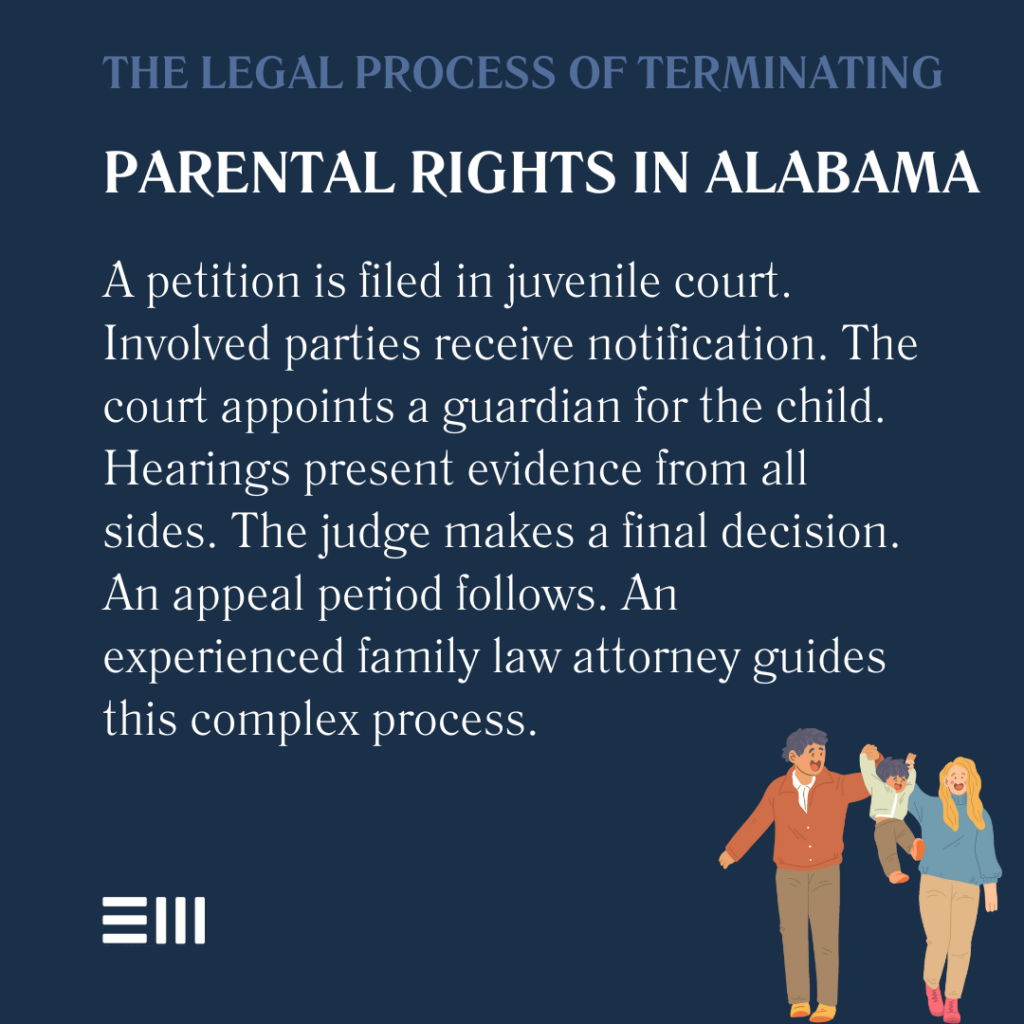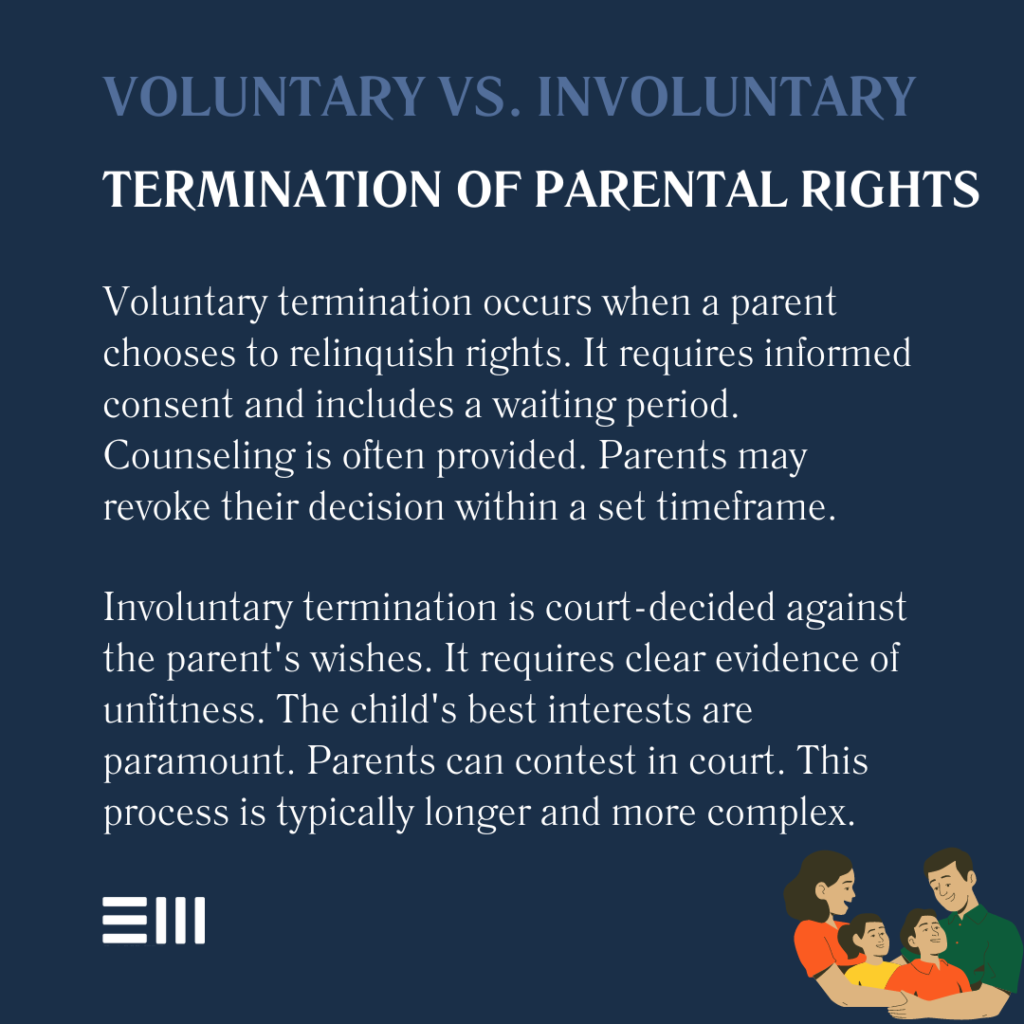
In Alabama, over 6,000 children are in foster care, with many awaiting adoption.
Terminating parental rights is often a critical step in this process, paving the way for new families to form and children to find permanent homes.
Understanding the intricacies of this legal procedure is essential for both birth parents considering relinquishment and prospective adoptive parents navigating the complexities of Alabama’s adoption laws.
Understanding Parental Rights Termination in Alabama
Terminating parental rights is a legal process that permanently severs the legal relationship between a parent and child.
This step is necessary before an adoption can be finalized, ensuring that the child is legally free to be adopted by a new family.
In Alabama, the termination of parental rights can occur voluntarily or involuntarily. Voluntary termination happens when a parent willingly relinquishes their rights, often in cases of adoption.
Involuntary termination occurs when the court determines that a parent is unfit or unable to care for the child.
The process involves several steps and can be emotionally challenging for all parties involved. It’s crucial to understand the legal requirements, potential outcomes, and long-term implications of this decision.
Grounds for Termination of Parental Rights
Alabama law outlines specific grounds for terminating parental rights. These grounds must be proven by clear and convincing evidence in court.
Some common reasons include:
- Abandonment;
- Severe abuse or neglect;
- Failure to support or maintain contact with the child;
- Inability to discharge parental responsibilities due to mental illness or addiction;
- Conviction of certain crimes, especially those involving children; and
- Failure to respond to termination proceedings.
Each case is unique, and the court considers various factors when determining whether to terminate parental rights. The child’s best interests are always the primary consideration in these proceedings.
The Legal Process of Terminating Parental Rights
Terminating parental rights in Alabama involves several steps:
- Filing a petition: The process begins when a petition is filed with the juvenile court. A parent, the Department of Human Resources, or a licensed child-placing agency can do this.
- Notification: All parties involved, including both parents, must be notified of the petition. If a parent’s whereabouts are unknown, the court may order publication of notice in a local newspaper.
- Appointment of a guardian ad litem: The court appoints a guardian ad litem to represent the child’s best interests throughout the proceedings.
- Court hearings: Multiple hearings may be held to present evidence and testimony. Both parents have the right to legal representation during these hearings.
- Judge’s decision: After considering all evidence, the judge makes a decision on whether to terminate parental rights.
- Appeal period: Following the judge’s decision, there is a period during which the decision can be appealed.
Throughout this process, it’s crucial to work with an experienced family law attorney who understands the nuances of Alabama’s adoption laws.

Voluntary vs. Involuntary Termination
Understanding the difference between voluntary and involuntary termination is crucial for all parties involved in the adoption process.
Voluntary Termination
Voluntary termination occurs when a parent willingly relinquishes their parental rights. This often happens in adoption cases where birth parents feel they cannot adequately care for the child and believe adoption is in the child’s best interest.
Key points about voluntary termination:
- Parents must give informed consent;
- There’s typically a waiting period after birth before consent can be given;
- Counseling may be required before consent is accepted; and
- Consent can be revoked within a specific timeframe.
Involuntary Termination
Involuntary termination happens when the court decides to terminate a parent’s rights against their wishes. This usually occurs in cases of severe neglect, abuse, or when a parent is deemed unfit.
Key points about involuntary termination:
- Requires clear and convincing evidence of grounds for termination;
- The child’s best interests are the primary consideration;
- Parents have the right to contest the termination; and
- More complex and typically takes longer than voluntary termination.
Both types of termination have significant legal and emotional implications. It’s essential to seek legal counsel to understand the process thoroughly.

Rights of Birth Parents
Birth parents have specific rights throughout the termination process, regardless of whether the termination is voluntary or involuntary:
- Right to legal representation: Parents have the right to an attorney. If they cannot afford one, the court may appoint a lawyer for them.
- Right to contest: In involuntary termination cases, parents have the right to contest the termination and present their case in court.
- Right to information: Parents are entitled to information about the termination process and its consequences.
- Right to counseling: In voluntary cases, parents may have the right to counseling before giving consent.
- Right to revoke consent: In voluntary cases, there’s typically a period during which parents can revoke their consent to termination.
Understanding these rights is crucial for birth parents navigating this complex process.
The Role of Alabama’s Department of Human Resources (DHR)
The Alabama Department of Human Resources plays a significant role in many parental rights termination cases, especially those involving child welfare.
DHR’s responsibilities include:
- Investigating reports of child abuse or neglect;
- Providing services to families to prevent the need for removal of children;
- Petitioning for termination of parental rights when necessary; and
- Facilitating adoptions of children in foster care.
DHR works to balance the rights of parents with the best interests of children. They often provide resources and support to families before considering termination of parental rights as a last resort.
The Adoption Process After Termination
Once parental rights are terminated, the child becomes legally free for adoption. The adoption process in Alabama typically involves:
- Home study: Prospective adoptive parents undergo a thorough evaluation.
- Matching: Children are matched with suitable adoptive families.
- Placement: The child is placed with the adoptive family for a trial period.
- Finalization: After a successful placement period, the adoption is finalized in court.
The timeframe for this process can vary greatly depending on individual circumstances. Working with a reputable adoption agency or attorney can help navigate this complex process.
Legal Considerations and Potential Challenges
Terminating parental rights and proceeding with adoption involves numerous legal considerations:
- Interstate issues: If the child or adoptive parents are from different states, additional laws may apply.
- Native American heritage: The Indian Child Welfare Act may impact proceedings if the child has Native American heritage.
- Contested terminations: If a parent contests the termination, the process can become lengthy and complex.
- Appeals: Decisions to terminate parental rights can be appealed, potentially extending the process.
It’s crucial to work with an experienced family law attorney who understands these nuances and can guide you through potential challenges.
Frequently Asked Questions About Parental Rights in Alabama
The process of terminating parental rights in Alabama for adoption can be complex and emotionally charged.
Here are answers to some commonly asked questions to help clarify the process and its implications.
How Long Does the Process of Terminating Parental Rights Take in Alabama?
The duration of the process can vary significantly depending on the circumstances. Voluntary terminations may be resolved in a few months, while contested, involuntary terminations can take a year or more.
Factors affecting the timeline include court schedules, whether the termination is contested, and the complexity of the case.
Can a Parent Voluntarily Terminate Their Own Parental Rights?
Yes, a parent can voluntarily relinquish their parental rights in Alabama. However, the court must still approve this decision, ensuring it’s in the child’s best interests.
Typically, voluntary termination is only approved when another party (such as a stepparent) is ready to adopt the child, ensuring the child will have two legal parents.
What Happens if One Parent Wants to Terminate Rights but the Other Doesn’t?
If one parent wishes to terminate their rights but the other doesn’t, the situation becomes more complex.
The court will consider the best interests of the child. If the termination is part of an adoption process (e.g., a stepparent adoption), it may proceed if it’s deemed beneficial for the child. However, if there’s no adoption plan, the court is unlikely to terminate one parent’s rights voluntarily.
Can Terminated Parental Rights Be Restored in Alabama?
Generally, the termination of parental rights is permanent in Alabama.
However, in extremely rare cases, if the termination was obtained through fraud or mistake, a parent might petition the court to set aside the termination. This is uncommon and requires extraordinary circumstances.
How Does Termination of Parental Rights Affect Child Support Obligations?
Termination of parental rights typically ends a parent’s obligation to pay child support. However, any back child support owed before the termination remains due.
It’s important to note that courts are often reluctant to terminate rights solely to end support obligations.
Take the Next Step
Navigating the process of terminating parental rights for adoption in Alabama can be complex and emotionally challenging.
Whether you’re a birth parent considering relinquishment or a prospective adoptive parent, having experienced legal guidance is crucial.
At Baxley Maniscalco, we understand the intricacies of Alabama’s adoption laws and the sensitive nature of these proceedings. Our team is committed to providing compassionate, professional support throughout this journey.
Don’t navigate this process alone. Contact Baxley Maniscalco today for a confidential consultation.
Can't find what you're looking for? Search our site below.










